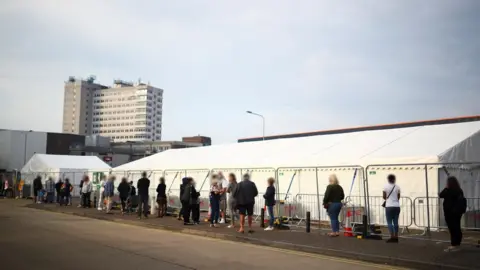Covid testing: Southend test and trace teams need to find 237 people
 Getty Images
Getty ImagesDoor-to-door inquiries could be used to trace 237 people thought to have been in contact with Covid-19 patients, a town's public health official said.
Southend-on-Sea's director of public health Krishna Ramkhelawon said email and phone methods had not been successful in a number of cases.
Doorstep coronavirus testing has been carried out elsewhere and started in Leicester since July.
Mr Ramkhelawon said door-knocking could begin "on the ground next week".
Until now, contact tracers have used telephone and email to get in touch with people who may have had a close association with a Covid-positive patient.
Statistics analysed by the BBC's Politics East TV programme show that, since NHS Test and Trace began in May, trackers had failed to contact 237 people who had potentially tested positive in the Essex seaside town.
In the county as a whole, 1,635 people had not been found.
'A challenge'
Niall Bojko, a track and tracer with the community service company Provide CIC, said more testing was vital to make the Track and Trace system work.
"If people who are not able to get tests are not going into isolation, that could see a rise in cases and it is an issue for us if we don't have their contact details," he said.
 Reuters
ReutersMr Ramkhelawon confirmed that long queues seen earlier this week at the Strong Street testing centre in Southend had disappeared once people realised they needed an appointment to get a test.
"It is a challenge for us because the only way we can contain this is being able to test people and then trace those people who have been in contact with those who are positive," he said.
Southend has one of the lowest levels of infection in the East of England, with a rate of 13.7 per 100,000 people.
Nick Hulme, Eastern region testing co-ordinator, said 25-30% of people applying for tests did not need them.
"Only people who are symptomatic or whose family members are symptomatic should have the test - it's not for those who just want to know," he said.
Mr Hulme said extra capacity in the labs which processed the test samples was being put in place across the region to ease the backlog.
Politics East is broadcast on BBC One on Sunday at 10:00 BST and available on the iPlayer after transmission

- SOCIAL DISTANCING: What are the rules now?
- LOOK-UP TOOL: How many cases in your area?
- YOUR QUESTIONS: Our answers on the "rule of six"
- LOCAL LOCKDOWNS: What happens if you have one?

Find BBC News: East of England on Facebook, Instagram and Twitter. If you have a story suggestion email [email protected]
